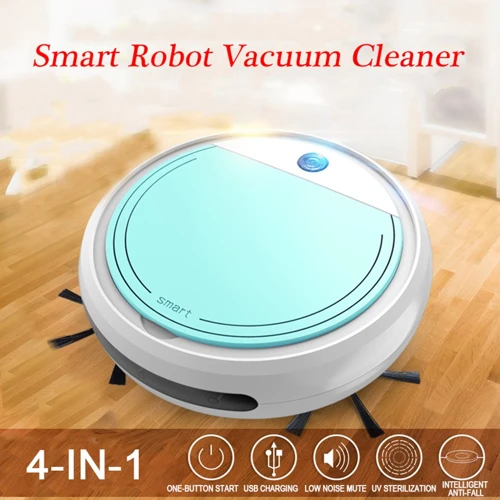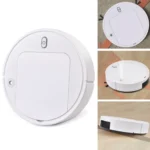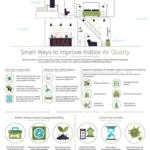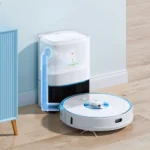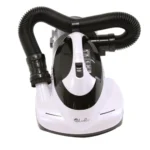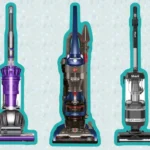As our homes are meant to be our sanctuaries, it’s disheartening to know that indoor allergens can still wreak havoc on our well-being. The good news is, UV sterilization technology, coupled with smart vacuum cleaners, can now provide us with cleaner and safer indoor air. But, what exactly is UV sterilization technology and how does it help with allergies? In this article, we’ll explore the answers to these questions and more, as well as provide tips on how to choose the best smart vacuum cleaner for allergy sufferers. Let’s dive in and discover how we can finally put our indoor allergies to rest.
What is UV Sterilization Technology?
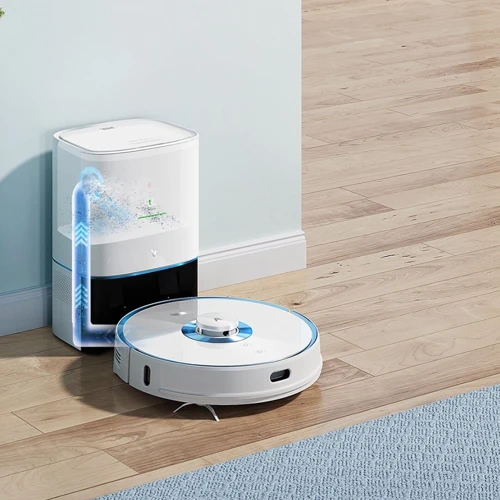
UV Sterilization Technology is a cutting-edge breakthrough that has revolutionized the traditional cleaning process in many industries. With the recent advances in technology, UV Sterilization has become a popular feature in many smart vacuum cleaners. This technology uses ultraviolet light to kill viruses, bacteria, and other microorganisms, making your cleaning process more efficient and effective. In the next section, we will delve deeper into how UV Sterilization Technology works and the benefits it offers. If you want to learn more about the role of UV Sterilization in smart vacuums, check out our guide on UV Sterilization and smart vacuums.
How Does it Work?
UV sterilization technology is a process where ultra-violet light is used to kill bacteria, viruses, and other microorganisms. This technology is increasingly being incorporated into smart vacuum cleaners to provide an added layer of protection against harmful germs and allergens.
Here’s how UV sterilization technology works in smart vacuum cleaners:
- The vacuum cleaner uses a UV-C light to emit short-wavelength ultraviolet radiation.
- The UV rays penetrate the cell walls of bacteria, viruses, and other microorganisms.
- The radiation damages the DNA or RNA of the microorganisms, preventing them from reproducing.
- The microorganisms are then rendered harmless and cannot cause any harm to humans.
UV sterilization technology is an effective way to disinfect surfaces, and it can kill up to 99.9% of germs and bacteria. This means that when you vacuum your floors, you not only pick up dirt and dust, but also kill germs and allergens that can cause health problems.
While traditional cleaning methods such as sweeping or using chemical disinfectants may kill some germs, they may not be as effective as UV sterilization technology. You can read more about the benefits of UV sterilization technology for smart vacuums at /benefits-uv-sterilization-smart-vacuum/.
It’s important to note that not all UV rays are created equal. UV-C rays are the most effective at killing germs, while UV-A rays are less effective. You can read more about the difference between UV-C and UV-A rays in smart vacuums at /uvc-vs-uva-in-smart-vacs/.
Now that you know how UV sterilization technology works in smart vacuums, you can understand why it’s becoming a popular feature in many models. If you’re looking to buy a smart vacuum cleaner with UV sterilization, you can check out our guide to the top 5 smart vacuums with UV technology at /top-5-smart-vacuums-uv-tech/. But before you buy, it’s important to know what features to look for, which we’ll cover in the next section.
What are the Benefits?
UV Sterilization Technology is gaining popularity for its ability to remove harmful bacteria, viruses, and other microorganisms from surfaces in our homes. Here are some of the benefits that come with using UV sterilization technology in your cleaning routine:
- Chemical-Free: One of the biggest advantages of UV sterilization technology is that it doesn’t require the use of any chemicals. This means you can clean your home in a more natural way without worrying about the potential side effects of harsh chemicals on your family or the environment.
- Destroys Germs: By using UV sterilization, you can effectively kill up to 99.9% of germs and bacteria that are present on surfaces in your home. This technology allows you to clean all the areas of your home with just one simple device, without having to worry about using multiple cleaning products to get the job done.
- Cost-Effective: Even though UV sterilization technology may seem like an expensive investment, in the long run, it can actually save you money. By eliminating the need for numerous cleaning products, you can save money on cleaning supplies and reduce your carbon footprint by producing less waste.
- Easy to Use: UV sterilization technology is very easy to use. All you need to do is turn on the device and hover it over the surfaces you want to clean. You can use it on any surface, whether it’s a table, a countertop, or a bathroom tile. It’s a great addition to any cleaning routine and can be used by anyone, regardless of their cleaning abilities.
Using UV sterilization technology in your cleaning routine can have a wide range of benefits. It’s a chemical-free, cost-effective, and easy-to-use way to clean your home while also eliminating harmful bacteria and germs. To learn more about UV sterilization technology and its benefits, check out our Smart Vacuum UV Sterilization Guide.
Allergies and Your Home
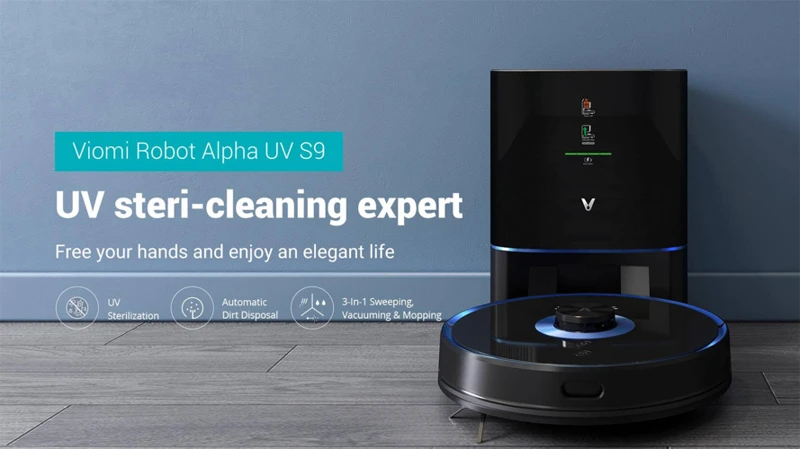
Keeping your home clean and allergen-free is crucial for overall health and well-being. Allergies are a common problem for many people and can be caused by a variety of indoor allergens such as dust mites, pet dander, and mold spores. According to the American College of Allergy, Asthma, and Immunology, over 50 million people in the United States suffer from allergies each year. Fortunately, technology has made it easier to combat these allergens with the use of smart vacuum cleaners equipped with UV sterilization technology. In this section, we will explore the causes of allergies, the benefits of smart vacuum cleaners, and how they can help you maintain a clean and healthy home. To learn more about UV sterilization technology and traditional cleaning methods, check out our previous guide “UV Sterilization vs. Traditional Cleaning” or our comprehensive “Smart Vacuum UV Sterilization Guide.”
What Causes Allergies?
Allergies are a result of your body’s immune system reacting to something that it perceives as harmful, even though it is not. These substances are called allergens, and they can be found in various forms. Here are some common allergens that might be present in your home:
- Dust Mites: These are microscopic creatures that thrive in warm and humid environments, such as bedding and upholstered furniture. Their feces and body parts can trigger allergies.
- Pollen: Pollen is a powder released by plants during the reproductive cycle. It can enter your home through open doors and windows and trigger allergies.
- Mold: Mold spores are present in the air and can grow in damp areas, such as bathrooms and kitchens. They can trigger allergies when they are inhaled or come into contact with the skin.
- Pet dander: This is the dead skin cells that pets shed. It can trigger allergies in people who are sensitive to it.
- Household chemicals: Many household cleaners contain chemicals that can irritate the skin and respiratory system.
Knowing what allergens are present in your home can help you take action to reduce your allergy symptoms. One effective way to combat allergens is by using a smart vacuum cleaner with UV sterilization technology. It can help eliminate allergens from your home and create a healthier environment.
How Can Smart Vacuum Cleaners Help?
Smart vacuum cleaners can help with allergies by utilizing UV sterilization technology to eliminate harmful bacteria, viruses, and allergens from your floors and carpets. They work by emitting UV-C rays that disrupt the DNA or RNA of microorganisms, rendering them unable to reproduce and effectively killing them. This technology is especially useful for those who suffer from allergies and asthma, as it helps to reduce the amount of dust mites, mold spores, and pet dander that can trigger asthma attacks and allergic reactions.
In addition to UV sterilization, many smart vacuum cleaners also feature powerful suction and filtration systems that are designed to capture even the smallest particles, such as pollen, dust, and pet hair. These features help to improve indoor air quality and create a healthier environment for those with allergies.
Another way that smart vacuum cleaners can help those with allergies is by offering remote control options. With the ability to control your vacuum cleaner from a distance, you can avoid being in the same room during cleaning, preventing exposure to any allergens that may have been released during the process.
To better understand the benefits of using a smart vacuum cleaner for allergies, take a look at the following table:
| Benefit | Description |
|---|---|
| UV Sterilization | Eliminates germs and bacteria that can trigger allergies |
| Powerful Suction | Captures even the smallest of particles, such as pollen and dust |
| Filtration System | Filters out allergens to improve indoor air quality |
| Remote Control | Allows for cleaning without being exposed to allergens |
Smart vacuum cleaners are an effective tool for those who suffer from allergies and asthma, as they help to reduce exposure to allergens and create a healthier indoor environment. When choosing a smart vacuum cleaner, it’s important to look for features such as UV sterilization, powerful suction, and advanced filtration systems to ensure that you’re getting the most benefit for your money.
The Benefits of Smart Vacuum Cleaners for Allergies
Smart vacuum cleaners are becoming an increasingly popular choice for people who suffer from allergies. Here are some of the benefits of using a smart vacuum cleaner for allergies:
- Efficiency: A smart vacuum cleaner can clean your home more efficiently than a traditional vacuum cleaner. With advanced sensors and mapping technology, smart vacuum cleaners can navigate your home and clean every corner without missing a spot.
- HEPA Filtration: Many smart vacuums come with high-efficiency particulate air (HEPA) filters. These filters are designed to capture small particles and allergens such as pollen, dust mites, and pet dander. This can help improve indoor air quality and reduce allergy symptoms.
- UV Sterilization: Some smart vacuum cleaners are equipped with UV sterilization technology. This means that as they clean, they also emit ultraviolet light that can kill bacteria and viruses on surfaces such as carpets and upholstery. This can help reduce the spread of germs and allergens that can cause allergies.
- Cordless Convenience: Many smart vacuum cleaners are cordless, which means they are easy to move around and use in different areas of your home. This can be particularly helpful when you need to clean high or hard-to-reach spaces.
- Programmable: Smart vacuum cleaners can be programmed to run on a schedule, so you can set them to clean your home while you’re away or sleeping. This ensures that your home stays clean and free of allergens without interrupting your daily routine.
- User-Friendly: Smart vacuum cleaners are designed to be user-friendly and easy to use. They often come with companion apps that allow you to control the vacuum from your smartphone or other device. This can be particularly helpful for people who suffer from allergies and want to keep their homes clean and allergen-free.
Using a smart vacuum cleaner can be an excellent investment for people who suffer from allergies. With advanced technology and features such as HEPA filters and UV sterilization, smart vacuum cleaners can help improve indoor air quality and reduce allergy symptoms. Additionally, their convenience and ease of use make them a great choice for anyone looking to keep their home clean and allergen-free.
How to Choose a Smart Vacuum Cleaner for Allergies
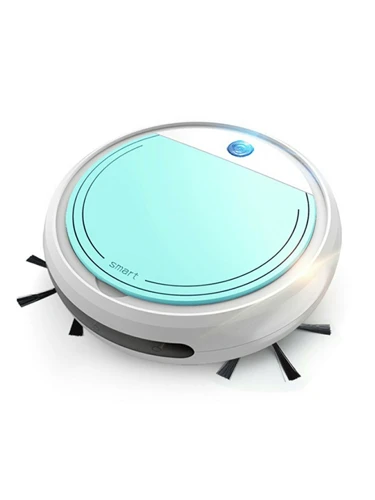
Choosing the right smart vacuum cleaner for allergies may seem overwhelming at first, but it doesn’t have to be. With so many options available on the market, it’s important to know what features to look for and what other considerations to keep in mind. By taking the time to do your research and understand your specific needs, you can find a smart vacuum cleaner that will effectively remove allergens from your home and improve your overall air quality. In this section, we’ll go over some key factors to consider when choosing a smart vacuum cleaner for allergies.
Features to Look For
When choosing a smart vacuum cleaner for allergies, there are several features to consider. These features can make a big difference in the effectiveness of the vacuum cleaner at removing allergens from your home. Here are some important features to look for:
- High suction power: Look for a vacuum cleaner with high suction power to ensure that the machine can pick up even the smallest allergen particles. A strong motor and good airflow are essential for effective cleaning.
- Filtration system: A good filtration system is essential for a smart vacuum cleaner that is designed to help with allergies. HEPA filters are particularly effective at trapping small allergen particles, so look for a vacuum cleaner that includes this type of filter. Some models also come with additional filters or other specialized features to help manage allergies, such as a charcoal filter for removing odors.
- UV sterilization: As mentioned previously, UV sterilization technology can be helpful in killing bacteria, mold, and viruses that may exacerbate allergy symptoms. Look for a vacuum cleaner that includes this feature if it is important to you.
- Smart sensors: Some smart vacuum cleaners include sensors that can detect the level of allergens in your home and adjust their cleaning to focus on areas of high concentration. These sensors may also be able to detect and avoid obstacles or adjust their cleaning based on the floor type.
- Multiple cleaning modes: Different cleaning modes can be helpful for different types of allergies or different parts of your home. For example, some smart vacuum cleaners have a “pet mode” that is designed to trap pet hair and dander more effectively, while others may have a “spot cleaning” mode that can focus on specific areas of your home.
- Quiet operation: If you or someone in your household is particularly sensitive to noise, look for a smart vacuum cleaner that operates quietly. Some models have a “quiet mode” that reduces noise levels, while others may simply have a low-decibel operation overall.
- App connectivity: Many smart vacuum cleaners can be controlled using a smartphone app or through voice assistants such as Amazon Alexa or Google Assistant. This can be helpful for customizing the vacuum’s cleaning schedule or adjusting its settings remotely.
Considering these features when choosing a smart vacuum cleaner for allergies can help ensure that you find a product that is effective at removing allergens from your home and improving air quality. Remember to also consider other factors such as price, brand reputation, and warranty when making your final decision.
Other Considerations
Aside from the features mentioned earlier, there are other considerations that you should keep in mind when choosing a smart vacuum cleaner for allergies. Here are some important factors to consider:
- Budget: Smart vacuum cleaners with UV sterilization technology can be more expensive than traditional ones. Make sure to set a budget and look for options that fall within your price range.
- Brand Reputation: It’s important to choose a brand that has a good reputation for making high-quality smart vacuum cleaners. Read reviews from other customers and do your research before making a purchase.
- Noise Level: Some smart vacuum cleaners can be quite loud, which may be an issue if you have pets or children at home. Look for models with low noise levels if this is a concern for you.
- Battery Life: If you opt for a cordless smart vacuum cleaner, check the battery life and how often it needs to be charged. You don’t want to be interrupted mid-cleaning due to a dead battery.
- Filter Replacement: Many smart vacuum cleaners have replaceable filters that need to be changed on a regular basis. Check how often this needs to be done and the cost of replacement filters.
- Warranty: Always check the warranty before making a purchase. A longer warranty period can give you peace of mind and protection against potential repairs or issues.
By keeping these other considerations in mind, you can make a more informed decision when choosing a smart vacuum cleaner for allergies. Don’t forget to assess your personal needs and preferences to find the best option for you.
Tips for Using Your Smart Vacuum Cleaner
Keeping your home clean and free from allergens can be a difficult task, but with the help of a smart vacuum cleaner, it can be made much easier. However, owning the latest and greatest vacuum cleaner on the market isn’t enough to ensure a healthy living environment. In order to make the most of your investment, there are several tips you should follow when using your smart vacuum cleaner. By incorporating these best practices into your cleaning routine, you can maximize the benefits of UV sterilization technology and keep your home allergen-free year-round.
Regular Cleaning Schedule
A regular cleaning schedule is crucial for maintaining a healthy, allergen-free home. Dust mites and other allergens can quickly accumulate in carpets and on surfaces, causing discomfort and irritation for those with allergies. Here are some tips for establishing a regular cleaning schedule:
- Set a schedule: Determine how frequently you need to clean each area of your home. For example, you may need to vacuum your carpets every other day, but you could clean your ceiling fans once a month. Make a schedule and stick to it.
- Prioritize high-traffic areas: Focus on cleaning the areas of your home that get the most use, such as living rooms, bedrooms, and kitchens.
- Use your smart vacuum cleaner: Your smart vacuum cleaner can make regular cleaning even easier. Schedule your vacuum to clean your floors automatically and regularly, so you can focus on other tasks.
- Don’t forget about hidden areas: Be sure to clean areas that may be easily overlooked, such as baseboards, curtains, and under furniture.
- Use allergy-friendly cleaning products: Look for cleaning products that are free of harsh chemicals and fragrances that can irritate allergies.
Establishing a regular cleaning schedule can help keep allergens at bay, reducing the risk of allergies and other respiratory issues. By using your smart vacuum cleaner to automate your cleaning routine and choosing allergy-friendly cleaning products, you can create a healthier environment for you and your family.
Proper Maintenance
Ensuring that your smart vacuum cleaner is properly maintained is crucial for ensuring optimal performance and longevity of the device. Here are some tips for proper maintenance:
- Clean the Filter: The filter of your vacuum cleaner is responsible for capturing dust and other allergens in the air. Over time, the filter can become clogged and lose its effectiveness. To prevent this, it’s important to regularly clean the filter and replace it when necessary. Depending on the model, filters may need to be replaced every 3-6 months.
- Empty the Dustbin: After each use, be sure to empty the dustbin of your vacuum cleaner. This will prevent any trapped allergens from being released back into the air. You should also clean the dustbin with soap and water regularly to prevent the buildup of bacteria and other germs.
- Clean the Brush Roll: The brush roll is responsible for picking up dirt and debris on your floors. Over time, it can become clogged with hair and other debris, reducing its effectiveness. To prevent this, it’s important to clean the brush roll regularly. Some vacuum cleaners come with a tool specifically designed for cleaning the brush roll.
- Check the Hose: The hose of your vacuum cleaner can become clogged with dirt and debris, reducing its suction power. To prevent this, it’s important to check the hose regularly and clear any blockages. You can do this by using a long object, such as a broom handle, to push any debris through the hose.
- Store Properly: When not in use, be sure to store your vacuum cleaner in a cool, dry place. Avoid storing it in direct sunlight or in a humid environment, as this can cause damage to the device over time.
By following these maintenance tips, you can ensure that your smart vacuum cleaner remains effective at capturing allergens and other contaminants in your home, providing relief for those suffering from allergies.
Other Tips
Here are some additional tips to help you get the most out of your smart vacuum cleaner and minimize allergies:
- Don’t forget to vacuum upholstery: Dust mites and other allergens can also accumulate on furniture and curtains, so make sure to vacuum those frequently as well.
- Use a HEPA filter: A HEPA filter is designed to capture even the smallest particles, so make sure your smart vacuum cleaner has one installed.
- Keep the air clean: If you have allergies, it’s important to keep the air in your home as clean as possible. Use an air purifier and keep windows closed during peak allergy season.
- Wash bedding regularly: Bedding can also accumulate dust mites and other allergens. Make sure to wash your bedding weekly in hot water to kill any dust mites.
- Don’t forget about your pet: If you have a furry friend at home, their hair can also trigger allergies. Use your smart vacuum cleaner to clean up after them frequently and make sure to groom them often.
By following these additional tips, you can create a cleaner and healthier environment for yourself and your family, and get the most out of your smart vacuum cleaner.
Conclusion
In conclusion, investing in a smart vacuum cleaner equipped with UV sterilization technology can greatly benefit those suffering from allergies. By eliminating allergens such as dust mites, pet hair, and pollen, these vacuums can provide a cleaner and healthier living environment. The benefits of UV sterilization technology not only include the removal of allergens but also the prevention of the spread of bacteria and viruses.
When choosing a smart vacuum cleaner for allergies, it’s important to look for features such as HEPA filters, strong suction power, and UV sterilization technology. Other considerations may include the size of your home and the type of flooring you have.
Using your smart vacuum cleaner regularly and properly maintaining it can also help to maximize its effectiveness. Keeping a regular cleaning schedule and paying attention to any maintenance needs can ensure that your vacuum is always in top condition.
Overall, smart vacuum cleaners with UV sterilization technology offer a convenient and effective solution for combating allergies in the home. With their advanced features and benefits, they can provide a cleaner living environment and improved quality of life for allergy sufferers. So, if you or anyone in your household suffers from allergies, investing in a smart vacuum cleaner with UV sterilization technology may be the right choice for you.
Frequently Asked Questions
What is the difference between regular vacuum cleaners and smart vacuum cleaners?
Regular vacuum cleaners simply suck up dirt and debris from the floor. Smart vacuum cleaners, on the other hand, use advanced technology like sensors and Wi-Fi connectivity to navigate around a room and clean efficiently.
What is UV sterilization technology and how does it work?
UV sterilization technology uses ultraviolet light to kill bacteria and viruses. When applied to a surface, the UV light damages the DNA of these microorganisms, rendering them unable to reproduce and causing them to die off.
Can using a smart vacuum cleaner help those with allergies?
Yes, the advanced features of a smart vacuum cleaner, such as strong suction power and UV sterilization technology, can effectively remove allergens and dust from your home, providing relief for allergy sufferers.
What are some common allergens found in homes?
Common allergens found in homes include dust mites, pet dander, mold spores, and pollen.
What are the benefits of UV sterilization technology?
UV sterilization technology can effectively kill bacteria and viruses without the use of chemicals or other harsh cleaning agents, making it a safe and eco-friendly cleaning solution.
Can UV sterilization technology be harmful to humans?
Exposure to UV light can be harmful to humans in large amounts, but the doses used in UV sterilization technology are low and pose no significant risks when used according to manufacturer instructions.
What features should I look for when choosing a smart vacuum cleaner for allergies?
Look for a smart vacuum cleaner with strong suction power, allergen filtration, and UV sterilization technology. Additional features like Wi-Fi connectivity and mobile app control can also be helpful.
How often should I use my smart vacuum cleaner for maximum effectiveness?
For best results, you should use your smart vacuum cleaner at least once a week, or more often if you have pets or heavy foot traffic in your home.
Can smart vacuum cleaners be used on multiple types of flooring?
Yes, most smart vacuum cleaners are designed to work on multiple types of flooring, including hardwood, tile, and carpet.
What is the importance of proper maintenance for a smart vacuum cleaner?
Proper maintenance for your smart vacuum cleaner can help ensure it operates efficiently and effectively over time. This includes regularly emptying the dustbin, cleaning the brushes, and replacing the filter as needed.
